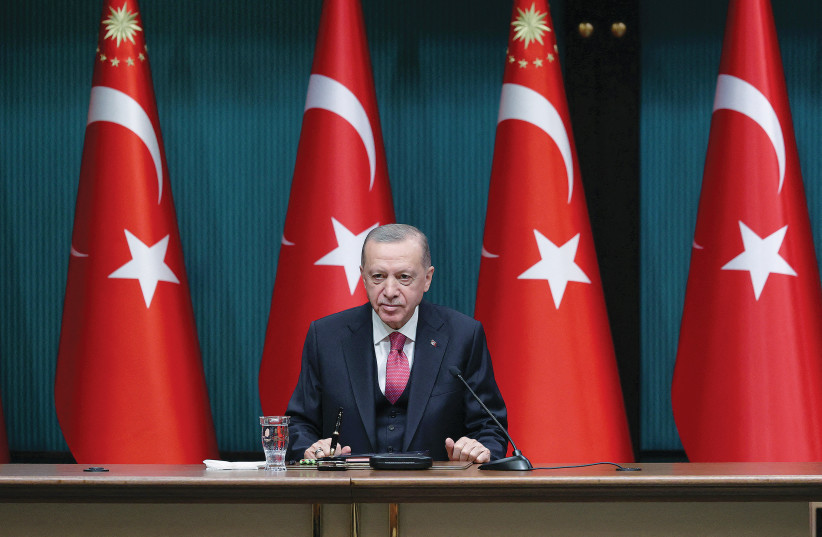Turkish, Syrian foreign ministers’ meeting looms ahead of elections
Turkey’s foreign minister will meet with his Syrian counterpart this week in a continued effort to thaw relations, as Ankara seeks to return refugees to Syria and continue their fight against Kurdish fighters near the Turkish-Syrian border.
The discontent in Turkey over the nearly 4 million Syrian refugees has been a source of domestic pressure on Turkish President Recep Tayyip Erdoğan, as well as a recurring issue in the campaigns for tightly contested presidential and parliamentary elections on May 14.
Turkish Foreign Minister Mevlüt Çavuşoğlu stated last Wednesday that he would meet with his Syrian, Russian, and Iranian counterparts on May 10 in Moscow. He added that they may discuss a potential leaders’ summit, raising the possibility that Erdoğan would meet with Syrian President Bashar Assad.
Ömer Özkizilcik, a foreign policy and security analyst based in Ankara, believes such a meeting is unlikely before the rapidly approaching Turkish elections.
“According to the polls, an Erdoğan-Assad summit will become even less likely as Erdoğan would have won the elections and would not have the domestic political motivation for meeting Assad,” he wrote in a message to The Media Line.
 Turkish President Tayyip Erdogan announces elections for May 14, 2023. (credit: (Presidential Press Office/Handout) REUTERS)
Turkish President Tayyip Erdogan announces elections for May 14, 2023. (credit: (Presidential Press Office/Handout) REUTERS)At odds over Syria policy
While Erdoğan has strengthened ties with Russian President Vladimir Putin for years, the two have been at odds over policy in Syria, where they have supported opposing forces. Erdoğan has backed Syrian rebels fighting against Assad, while Putin is the main backer of the Syrian president and has stood in the way of Erdoğan’s ambitions in Syria.
Last year, Erdoğan repeatedly said Turkey would launch another offensive into Syria against Kurdish fighters threatening Turkey from across the Syrian border. According to a report by Reuters, an unnamed senior Turkish official stated that Turkey would focus on targets in Syria after finishing a military operation against Kurdish forces in Iraq. However, after the Kremlin voiced its opposition to such an offensive, Turkey never went through with it.
In late April, the defense ministers and heads of intelligence of the four countries—Iran, Russia, Syria and Turkey—met in Moscow.
“With our efforts, we are providing as positive and stable an environment in Syria as possible. By improving conditions there, we will ensure that the Syrian brothers and sisters we are hosting in our country can return to their homeland voluntarily in a safe and respectful manner,” Turkish Defense Minister Hulusi Akar said during the summit.
Capitalizing on tensions in the Turkish population
Turkish opposition parties have attempted to capitalize politically on the tensions between refugees and the Turkish population, arguing that Syrians are threatening Turkish people’s way of life. The presidential candidate from the main opposition alliance emphasized that one of his top goals would be to return Syrians home and has supported talks with Assad to this end for many years.
However, Özkizilcik argued that while the issue of refugees is still present in politics, it has decreased in importance.
“We can say that the ruling party succeeded in taking the refugee card away from the opposition by engaging with the Assad regime,” he wrote.
Foreign Minister Çavuşoğlu said the aim of next week’s meeting would be to reinforce stability and ensure Syria’s territorial integrity. The Turkish government has said it wants to set up a “safe zone” in northern Syria where it believes refugees could safely return to.
Syria has said it can only restore relations with Turkey if it withdraws its troops from Syria. Ankara has troops stationed in northern Syria and has launched several offensives into the country to combat US-backed Kurdish fighters that it believes are connected to a Kurdish militia in Turkey.
However, the removal of Turkish soldiers from the northern Idlib region would increase the likelihood of an advance by Assad’s forces into this opposition-held area, causing civilians to flee to Turkey and creating a major refugee crisis on Turkey’s border.
Former Turkish diplomat Imdat Oner told The Media Line that Erdoğan’s government wants to reach an agreement with the other countries on how to eliminate the presence of Kurdish fighters in northern Syria, as well as find a way to facilitate the return of Syrian refugees.
“That’s why now the Turkish government wants to use this before the elections,” Oner said. “However, the Assad regime knows this will help Erdoğan before the elections, so they don’t want to give this opportunity that Erdoğan could use in domestic politics.”





Comments are closed.